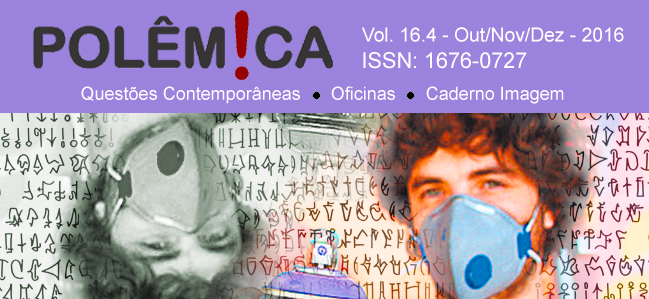A MORTE DO OUTRO NÃO É A MINHA, MAS PODE REPRESENTAR O MEU MORRER: REFLEXÕES FENOMENOLÓGICAS
DOI:
https://doi.org/10.12957/polemica.2016.26450Resumo
DOI: 10.12957/polemica.2016.26450
________
Resumo: Objetivando levantar as percepções e representações sobre a morte e o morrer, foi realizada uma pesquisa qualitativa, por meio de entrevista, seguida por um grupo focal, com alunos do curso de Psicologia de uma universidade privada do triângulo mineiro. As investigações fenomenológicas demonstraram um possível percurso rumo à busca da autenticidade, segundo Heidegger (1996), metaforicamente indo da luz (negação por meio da crença além morte), passando para sombra (evitação da dor e sofrimento), espelhando a própria morte (reconhecendo o seu próprio morrer) até ao nada e a possibilidade de refletir sobre as ilusões vivenciadas para evitar a própria morte, silenciando-as e libertando o homem para escolhas autênticas. Os estudos revelaram ainda a importância do cuidar e o fazer diante da morte, explicitando a importância de se vivenciar o luto e a preparação do homem para lidar com sua finitude. Assim, o luto deve ser mais humanizado e menos banal, devendo ser respeitada a dor do outro, mas sem buscar atalhos para essa dor. É buscar acolhimento, eliminar a culpa social, revelando os novos sentidos que o processo poderá trazer na vida de quem fica. Esse deveria ser o verdadeiro papel das pessoas diante da morte e do morrer.
Palavras chaves: Percepção de Morte. Método Fenomenológico. Autenticidade.
__________Abstract: Aiming to raise the perceptions and representations of death and dying, a qualitative research was carried out through interviews, followed by a focus group with students of Psychology of a private university in the Brazil. Phenomenological investigations showed a possible route towards the pursuit of authenticity, according Heidegger (1996) metaphorically going light (denial through belief beyond death), passing shadow (avoidance of pain and suffering), mirroring his own death (recognizing his own death) to the nothing and the ability to reflect on the lived illusions to avoid his own death, silencing them and releasing the man to authentic choices. The studies also revealed the importance of care and make the face of death, explaining the importance of experiencing grief and preparation of man to handle his finitude. Thus, the fight should be more humane and less banal and should be respected the other's pain, but without seeking shortcuts to this pain. It is seeking host, eliminating social guilt, revealing new ways that the process can bring the lives of those who stay. This should be the real role of people facing death and dying.
Keywords: Death Perception. Phenomenological method. Authenticity.Downloads
Publicado
Como Citar
Edição
Seção
Licença
Cabem ao autor/autora os direitos autorais dos artigos publicados na Polêm!ca, resguardando-se à revista o direito de primeira publicação. Cientes, revista e autores/as, que todos os artigos são de uso gratuito, para fins educacionais e não-comerciais, permitindo que outros remixem, adaptem e construam sobre o trabalho, desde que citada a fonte, quando da sua utilização integral ou parcial, de acordo com a licença Creative Commons CC BY-NC.
O(s) autor(es) tem/têm autorização para assumir contratos adicionais separadamente, para distribuição não-exclusiva da versão do trabalho publicada nesta revista (ex.: publicar em repositório institucional ou como capítulo de livro), com reconhecimento de autoria e publicação inicial nesta revista.
Respeitando a licença autoral adotada pela Polêm!ca, estimulamos nossos leitores a promover, refletir e escrever, a partir das nossas publicações, incluindo nas citações o link para o artigo disponível no site da Revista Polêm!ca, sempre que um artigo for citado ou replicado, e observando a grafia correta do nome da revista Polêm!ca.
Todo o conteúdo de terceiros (imagens, trechos, citações, etc.) deverá possuir referências a sua fonte original adicionadas como notas de rodapé ou referências bibliográficas com sua devida identificação.
Artigos submetidos que contiverem citações, tabelas ou imagens extraídas de outras publicações não serão aceitos, caso possuam mais conteúdo de terceiros do que conteúdo original.

Revista Polêm!ca está licenciada com uma Licença Creative Commons Atribuição-NãoComercial 4.0 Internacional.



